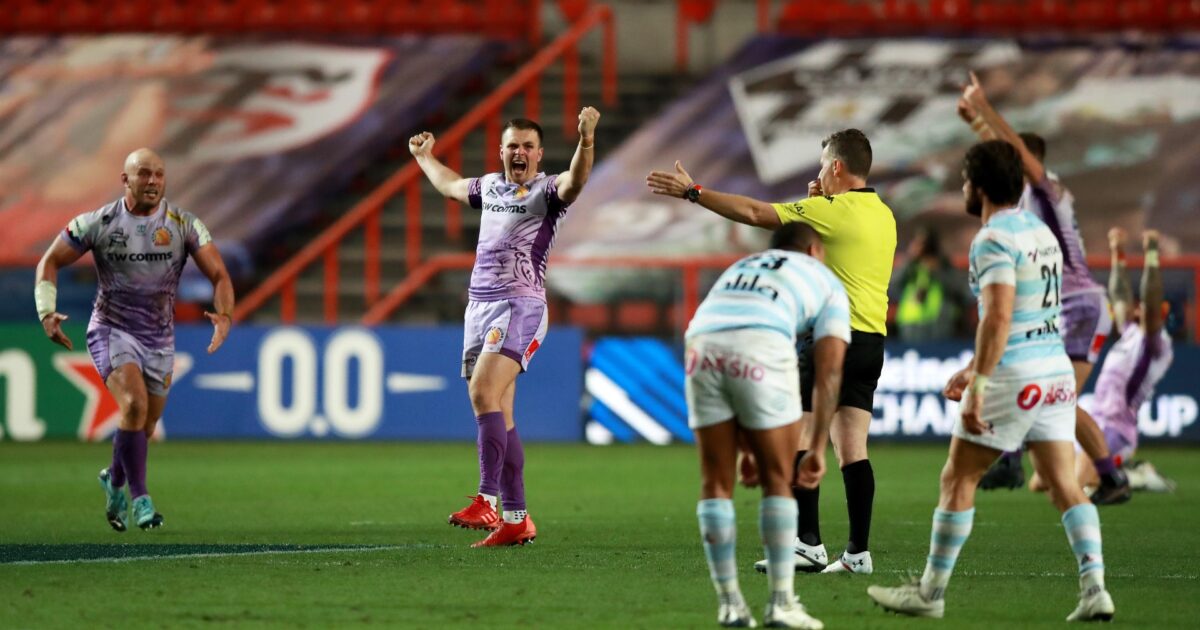Champions Cup final's bizarre end: Referee Owens has feisty exchange with his TMO

The 2020 Champions Cup final will go down in history as one of the best spectacles ever in the 25-year history of the sparkling European tournament, but it also had a bizarre American football-style review of the clock right at the finish involving Nigel Owens before Exeter were confirmed as 31-27 winners over Racing.
Veteran Welsh official Owens, taking charge of his seventh European final, initially called time out after he had awarded a last-minute penalty to Exeter with the Chiefs ahead 28-27 in the eight-try thriller.
Before Exeter had made their decision to kick for the posts, Owens was heard on his referee mic saying to his timekeeper in the stands, “Time out. Stop the clock. Take the clock back six seconds, take the clock back five seconds, please.
“There is too many people talking here. Take the clock back five seconds. I have taken the clock back five seconds. The time is 79:32.”
This was followed by a short delay for the kicking tee to arrive for Joe Simmonds. “Give them five seconds from now. It won’t make much difference now. Time is on,” said Owens. TMO Ian Davies was heard replying, “We’re trying to sort that out Nige, don’t worry.”
The drama! ?
Slight error in the match clock delayed the full-time whistle but @ExeterChiefs are the Champions of Europe! ?#EXEvR92 | #HeinekenChampionsCup | #VMTVRugby pic.twitter.com/X7bjkFHlFW
— Virgin Media Sport (@VMSportIE) October 17, 2020
Simmonds, the 23-year-old Exeter skipper, stepped forward to score the kick but the match then descended into further confusion on the halfway line with Racing lined up for a quick kick-off in the belief there was still time remaining.
That led to Owens intervening once more. “Hang on, hang on. Time out. We need to be clear what has happened. Hang on. I’m going checking here now. The time keeper didn’t put it on for some reasons. Wait a minute. Captain please come here,” he said, calling over Racing’s Henry Chavancy.
“I’m going to check with TMO if the clock had gone 80 before the kick is over. If it was it is the end of the game. If it’s not we will be kicking off. Okay? Apologies for this. Right, TM, please confirm for me if time was up before the kick was over?
ID: “Okay Nigel, I will explain what happened. You asked for time to go on. We were working with the producers to get that clock turned on. They were unable to do so when you asked. Okay? However, when the ball crossed the posts it was around 79:57. Okay? The clock should have been in excess of 80 because the clock was not put on.
NO: “Okay, so you’re telling me… all I want to know is when the ball went over the posts was the time up, yes or no?
ID: “Technically, yes the time was up.”
NO: “I don’t want your technically. I need to now is the time up yes or no please when the ball went over the post.
ID: “The clock was on 79:57 when it went over.”
NO: “So, it’s not over then?”
ID: “I will repeat, when you asked for the clock to be put on we were unable to do so on the TV.”
NO: “Right, so the time is over, you’re telling me?”
ID: “Yes, the time is over.”
Owens then turned to Racing to say he had just had “confirmation the time is over before the ball was over” the posts from Simmonds kick. He then blew his whistle to signal full-time, confirming Exeter were European champions and leaving Racing to lick the wound of a third Champions Cup final defeat in five seasons.
Will @ExeterChiefs be the new driving force in European rugby?
Exeter were in the fourth tier of English rugby when @StadeToulousain won the first ever @ChampionsCup in 1996 ?#C4Rugby #HeinekenChampionsCup pic.twitter.com/WNmTPMYjZn
— Channel 4 Sport (@C4Sport) October 17, 2020

























